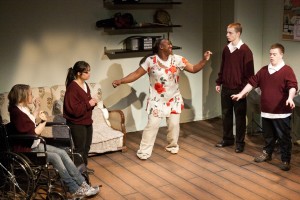For every enterprise that grows through a mixed palette of investment and management support, there is the business thwarted by a seemingly impenetrable wall of investment options. Read my piece on how businesses might attract social investment on the Guardian’s social enterprise network here.
Category Archives: Cuts
The cuts: the worst is yet to come
An authoritative analysis in today’s Society Guardian of the deepest spending cuts in a generation, which start from Friday. The special issue inludes some sector by sector breakdowns of savings and job losses, including pieces I contributed to the in-depth coverage.
The cuts – an alternative
For those who’ve not already seen it, this powerful film presents an alternative to the government’s devastating cuts agenda. It features community groups and anti-cuts campaigners along with Bill Nighy, Radiohead’s Ed O’Brien and Zac Goldsmith MP. Worth watching ahead of this weekend’s demo in London against the cuts.
It Cuts Both Ways…The Alternatives from Oonagh Cousins on Vimeo.
Fiction based on fact; theatre explores the threat to special needs provision
Art mirrors life for those of us with an interest in learning disability issues as a London play explores the threat to special needs schools. The play coincides with the government’s plans to overhaul special educational provision and comes at a time when learning disablility support is in jeopardy thanks to public spending cuts.

Death of a Nightingale runs at Hampstead’s New End Theatre until Sunday 3 April and focuses on the inclusion agenda which can shoehorn children with special needs into mainstream schools that offer inadequate support.
The play, written by Alan Share, a former chair of governors at a special school, also addresses the problems when a special school is threatened with closure. Since 1997, more than 100 special schools have closed, resulting in the loss of about 9,000 places for children.
Professional actors are joined on stage with learning disabled young people from the Oak Lodge School in East Finchley. The cast includes 18-year-old Max Lewis, an actor with Downs syndrome who appeared in Notes on a Scandal. Lewis plays a pupil who truants from schools that fail to meet his needs.
Written in 2009, the play is being resurrected to coincide with the government’s green paper on special educational needs. Share describes the green paper as “yet another missed opportunity for the government”. He adds: “It wants to find a quick fix for children with moderate learning difficulties and avoid the challenge of meeting more complex and varied needs.”
For more on the green paper and special educational needs provision, check out the very good Guerrillamum blog.
“Each day you spend leaves you with one less, spend them wisely”


Solle Frankel, aged 100
It’s sound advice from Solle yet, as young people, we rarely take the time to stop and listen to the older generation. A survey undertaken late last year by the charity Jewish Care revealed that only a third of Londoners thought that people over the age of 70 were important to society. The charity, which provides health and social care services to hundreds of older people every week, responded in November 2010 with its bold awareness campaign Pearls of Wisdom. The campaign asks the vital question: what can we learn from our elders?
The charity asked fourteen clients to share some valuable bits of advice, drawn from their long and varied lives. The effect was a powerful, unique and at times funny collection of life lessons, ranging from warming affirmations about love – “Get a goodnight kiss, every night” Jerry Cooper, 87 – to astute observations about money – “Don’t buy the things that you can’t afford.. pay your debts”, Jean Nadler, 90.
The fact that older people can be witty, insightful and interesting should go without saying. Yet statistics show that only around half of those aged under 35 have spent quality time with anybody over the age of 70 in the last six months indicating a real reluctance to connect with a social group considered “past it”.
So what’s the thinking behind this? It’s not exactly that we don’t care, but so many of us unthinkingly buy into an established social stereotype: older people are grey, boring and a burden on society. Thankfully, several attempts have made recently to dispel this image. The BBC’s latest hit, When Teenage Meets Old Age, and the recently launched Campaign to End Loneliness, follow a similar track to Pearls. The Campaign to End Loneliness, a collaboration between four different organisations- WRVS, Age UK Oxfordshire, Independent Age and Counsel and Care- wants the ‘Big Society’ to volunteer it’s time to do more for older people. The campaign, which began last month, has highlighted the seriousness of a reality where an average of 10% of our senior citizens feel either “severely lonely” or “always lonely”. Visitors to the campaign’s website are invited to offer their time to an older person or share their tips on how to combat loneliness. It’s not clear yet what the impact has been but the campaign’s report into the UK’s “epidemic of loneliness” is a much needed call to action.
Add to this the success of the website We Are What We Do, an example of original, digital action. We Are What We Do, a not-for-profit company founded by community worker David Robinson, were horrified to discover that two-thirds of Britons now believe that young and older people live in separate worlds. In response, the organisation asked younger people to pledge to make the world a brighter place by undertaking a number of small activities with their seniors. From learning older people’s tried and tested recipes to teaching your granny how to text, the website aims to highlight the myriad ways you can bond across the generations. As a result, nearly 10,000 people have signed up online and the community continues to grow.
At a time when Britain’s population is ageing rapidly and the media seems intent on playing up inter-generational conflict (the supposed battle between the beleagured baby boomers and the spoilt students, as the newspapers like to put it, these new campaigns offer a fresh perspective. It’s also a message that young people are receptive to. As Eitan Amias, a 17-year-old volunteer at one of Jewish Care’s Reubens House residential home in Finchley explains, intergenerational interaction benefits everyone involved: “when visiting the home I feel that I’m not just helping the residents but also myself, as I tend to take that positive energy with me to last the rest of the week”
But for many young people volunteering to spend time with the older generation can offer more than just a glowing feeling of pride. It’s also a valuable way to learn new skills, an increasingly important concern as youth unemployment reaches crisis point.
Indeed, volunteering can be crucial in securing that elusive first job after graduation, as Jamie Field, Jewish Care’s youth and community development officer, discovered. Jamie started working for Jewish Care as a volunteer, aged 15, but the experience he gained through charity work helped him land his current, paid role at the organisation after university.
However, Jamie believes “it’s important to make volunteering cool. It has to be relevant… you could write a newsletter, make a movie or use your skills to help someone use a computer’; young people need to be challenged and inspired and charities can’t be complacent, even in the midst of a recession when young people have more time on their hands to help. Jamie emphasises that young volunteers can use their charity experience not just to get jobs, but also to assist them with their Duke of Edinburgh Awards or to provide additional material for their UCAS forms. So, perhaps it really is time to take Solle’s advice and start spending our time a little more wisely.
Digital switchover boss pledges help to the hardest to reach
Peter White must be the only chartered accountant in the country with a corporate slogan that could belong to a social exclusion charity – “Nobody left behind” – a clutch of charity partnerships under his belt and a network of neighbourhood activists whose grassroots knowledge helps him do his job. Read my Society Guardian interview here with Peter White, the head of the BBC’s digital switchover scheme who is trying to ensure nobody is left with a blank TV screen.
Village shops; the tip of the rural social enterprise iceberg
The community-owned and run village shop in the Archers gave rural social enterprises a welcome figurehead but projects in real life provide much more than groceries. Read Saba Salman’s piece on the Guardian social enterprise network site.
Small steps towards a big society approach to learning
There is something of a gaping reality chasm between the vision of the big society and its fruition, not to mention growing accusations that the concept is a smokescreen for cuts. The chasm between vision and fruition might be narrowed by better and stronger mechanisms for civic service – or simply more hours in the day, as big society tsar Nat Wei recently demonstrated.
However, one scheme that has slowly and steadily supported and facilitated volunteers to promote an activity – in this case, adult learning – is the Community Learning Champions project. The drive, a joint partnership between NIACE (the National Institute of Adult Continuing Education), WEA, lifelong learning organsiation unionlearn and education consultants Martin Yarnit Associates, involves people who become active in their community by promoting the value of learning to others.
Launched in August 2009 , the three-year £3m Department of Business, Innovation and Skills (BIS) funded scheme ends in March (but of course!) but its ripple effect has been felt at a community level by hundreds of people. More than 1,000 champions should be registered by the end of next month and, if NIACE estimates are right and each champion encourages an average 30 people into learning, 30,000 individuals should be helped into learning as a result.
Champions promote learning among their friends, neighbours, relatives, or workmates; they are trusted as they speak from experience and act as role models to encourage others to take up new skills.
Homeless charity St Mungo’s – which of course has huge concerns about funding cuts – used the Community Learning Champions scheme last year to recruit up to 30 homeless volunteers to become learning champions.
The volunteers, recruited through the charity’s client representative group Outside In which managed the project, encouraged others get involved in learning, anything from gym classes to art workshops.
In the film here, St Mungo’s service user Richard talks about his love of soaking up new knowledge and the difference you can make thanks to a non-classroom learning environment. As he says: “All the time I was homeless, on drugs, this is the sort of thing I always had in my head that when I eventually sorted my life out, it’s the sort of thing I wanted to be doing.”
There’s no place like home
I was really struck by these atmospheric, beautifully shot videos which use characters from the Wizard of Oz to expose the lives of the hidden homeless, taking the film’s iconic line ‘There’s no place like home’ as inspiration.
Produced to show during the charity Crisis’ recent Coldplay Hidden Gigs in Newcastle and Liverpool, they’ve just gone on public release. Dorothy, the Cowardly Lion and the Scarecrow face different aspects of homelessness that most people aren’t aware of.
Dorothy flees violence in a B&B, the Cowardly Lion outsays his welcome on a friend’s sofa and the Scarecrow is a lonely squatter.
If using a vintage Hollywood movie to highlight a contemporary social issue via some pleasing visuals sounds like a totally random stab for publicity, then that’s exactly what it is – and frankly, why not?
As Crisis chief executive Leslie Morphy says: “We are always looking for new ways to bring to attention the hidden crisis of homelessness. We hope these videos make people think about the issue, and hopefully help us in our mission to end homelessness by donating or campaigning for change.”
Official statistics at the end of last year showed rising homelessness. Housing minister Grant Shapps insists that the cuts agenda won’t impact on the homeless, but how, with benefits decimated and support services withering away, can the housing situation of the vulnerable be guaranteed?
The Scarecrow
The Cowardly Lion
Dorothy
The videos were created by Liverpool/London creative agency Mercy, and directed by Nick Brown.
Self-help housing solutions
Self-help housing can help solve employment as well as housing problems – so here’s a belated nudge to a piece by Kate Murray, regular Social Issue blogger, which explores the below-the-radar world of community housing projects in Society Guardian.
